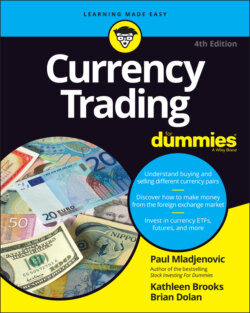Читать книгу Currency Trading For Dummies - Kathleen Brooks - Страница 55
Stepping onto a currency trading floor
ОглавлениеAlthough trading rooms in the large banks have shrunk since the 2008–2009 financial crisis, interbank trading rooms can still be lively and are staffed by a variety of different market professionals, each of whom has a different role to play. The typical currency trading room has
Flow traders: Sometimes called execution traders, these are the market-makers, showing two-way prices at which to buy and sell, for the bank’s customers. If the customer makes a trade, the execution trader then has to cover the resulting deal in the interbank market, hopefully at a profit. These traders are also responsible for watching and executing customer orders in the market. These are the traders who are generating most of the electronic prices and price action.
Proprietary traders: These traders are focused on speculative trading for the bank’s own account. Their strategies can run the gamut from short-term day trading to longer-term macroeconomic bets. In the wake of the 2008–2009 financial crisis and changes to regulation such as the Volcker Rule, there has been a sharp decline in banks’ trading for their own accounts, and many proprietary trading desks have closed down or moved to hedge funds.
Forward traders: Forward traders are active in the forward currency market, which refers to trades made beyond the normal spot value date. The forward market is essentially an interest rate differential market, where the interest rates of the various currencies are traded. These traders provide the bank’s customers with pricing for non-spot deals or currency swap agreements. They also manage the bank’s interest rate exposure in the various currencies.
Options traders: Options traders manage the bank’s portfolio, or book, of outstanding currency options. They hedge the portfolio in the spot market, speculate for the bank’s own account with option strategies, and provide pricing to the bank’s customers on requested option strategies. (Flip to Chapter 15 for more about currency options.)
Sales staff: The sales staff acts as the intermediary between the trading desk and the bank’s customers. They advise the bank’s customers on market flow, as well as who’s buying and selling; recommend spot and option trading strategies; and execute trades between the bank and its customers.
